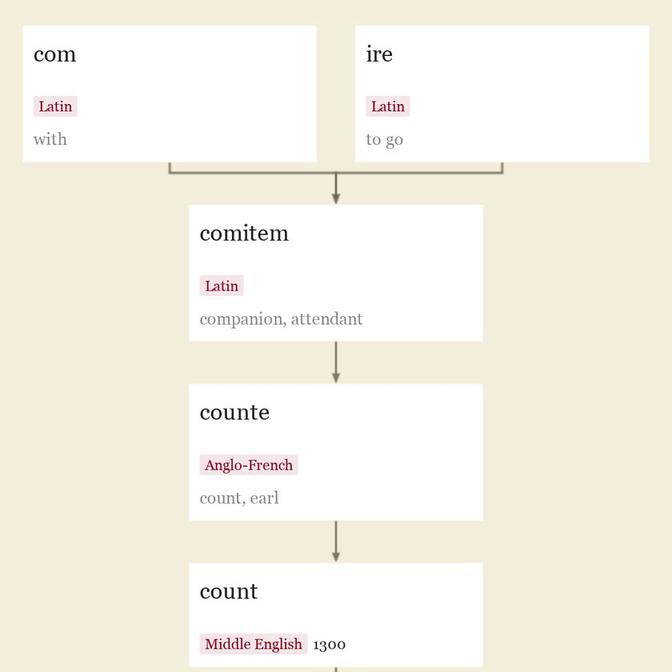county (n.)
14世纪中期,“郡,一个为政治和行政目的而确定的国家或州的明确划分”,来自盎格鲁-法语 counte,源自晚期拉丁语 comitatus “伯爵的管辖区”,源自拉丁语 comes(见 count(n.1))。它取代了古英语 scir “郡”。
从14世纪末开始,“伯爵或伯爵的领地”。County palatine,一种具有特殊特权的区域(兰开斯特,切斯特,达勒姆)始于15世纪中期。County seat “县政府所在地”于1848年出现在美国英语中。
county 的相关词汇

在一些大陆国家中,贵族的称号,对应于英国的 earl,大约在公元1300年左右,源自盎格鲁-法语的 counte "伯爵,伯爵"(古法语 conte),源自拉丁语的 comitem(主格 comes)"同伴,随从",罗马时期对省长的称呼,源自 com "和"(参见 com-)+ ire "去"的词干(源自 PIE 词根 *ei- "去")。这个术语在盎格鲁-法语中用来翻译古英语的 eorl,但这个词从未真正被本土化,主要是用来指外国的称号。
In ancient Rome and the Roman empire, [a comes was] a companion of or attendant upon a great person; hence, the title of an adjutant to a proconsul or the like, afterward specifically of the immediate personal counselors of the emperor, and finally of many high officers, the most important of whom were the prototypes of the medieval counts. [Century Dictionary]
在古罗马和罗马帝国中,[ comes ]是伟大人物的同伴或随从; 因此,是副总督等的副官的称号,后来特指皇帝的直接个人顾问,并最终成为许多高级官员的称号,其中最重要的是中世纪伯爵的原型。[世纪词典]
原始印欧词根表示“前进”。
它构成或构成部分: Abitur ; adit ; ambience ; ambient ; ambit ; ambition ; ambitious ; andante ; anion ; cation ; circuit ; coitus ; commence ; commencement ; concomitant ; constable ; count (n.1)贵族的头衔; county ; dysprosium ; errant ; exit ; initial ; initiate ; initiation ; introit ; ion ; issue ; itinerant ; itinerary ; janitor ; January ; Janus ; Jena ; Mahayana ; obiter ; obituary ; perish ; praetor ; Praetorian ; preterite ; sedition ; sudden ; trance ; transient ; transit ; transitive ; viscount 。
梵语 e'ti “走”, imas “我们走”, ayanam “一种前进,路径”; 阿维斯陀语 ae'iti “走”,古波斯语 aitiy “走”; 希腊语 ienai “前进”; 拉丁语 ire “前进”, iter “一种道路”; 古爱尔兰语 ethaim “我去”,爱尔兰语 bothar “一条道路”(来自 *bou-itro- “牛的路”),高卢语 eimu “我们走”; 立陶宛语 eiti “前进”; 古教会斯拉夫语 iti “走”; 保加利亚语 ida “我走”; 俄语 idti “前进”; 哥特语 iddja “已经走了”。
中古英语 shire,源自古英语 scir, scyr,意为“行政办公室,管辖区域,管理,权威”,特指“地区,省份,国家”,源自西日耳曼语 *skiru-,源自原始日耳曼语 *skizo(也是古高地德语 scira “照顾,官方职责”的来源)。自14世纪以来被盎格鲁-法语 county 所取代。
上流社会的意义源自 The Shires(1796),被英格兰其他地区的人们用来指那些以 -shire 结尾的县,这些县位于伦敦以北和以西; 这个意义在约1860年被转移到了“中部狩猎区”。